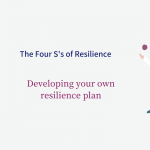In today’s fast-paced and demanding work environment, burnout has become a prevalent issue affecting individuals across various industries. Achieving a healthy work-life balance is essential for maintaining overall well-being and preventing burnout. This article explores strategies that can help individuals prioritize self-care, manage stress, and establish boundaries to promote work-life balance and prevent burnout.
I. Understanding Burnout:
Burnout is a state of physical, mental, and emotional exhaustion resulting from chronic work-related stress. It can manifest as feelings of fatigue, cynicism, reduced productivity, and a lack of motivation. Recognizing the signs and symptoms of burnout is crucial for taking proactive steps to prevent its onset.
II. Setting Priorities and Establishing Boundaries:
a) Clarify Values and Priorities: Reflect on personal values and priorities to establish a clear sense of what matters most in life. This clarity allows individuals to align their actions and decisions with their core values, ensuring that time and energy are allocated accordingly.
b) Define Boundaries: Establish clear boundaries between work and personal life. This might involve setting specific working hours, avoiding checking work emails outside of designated times, and protecting personal time for self-care, hobbies, and relationships.
III. Time Management and Organization:
a) Prioritize Tasks: Practice effective time management by prioritizing tasks based on urgency and importance. Break down larger projects into smaller, manageable tasks and allocate time blocks for focused work. This approach helps reduce overwhelm and enhances productivity.
b) Delegate and Seek Support: Learn to delegate tasks and ask for help when needed. Recognize that it is not necessary to shoulder all responsibilities alone. Delegating tasks and seeking support from colleagues or family members can lighten the workload and create space for personal well-being.
IV. Self-Care and Well-being:
a) Take Regular Breaks: Incorporate regular breaks throughout the workday to recharge and rejuvenate. Engage in activities that promote relaxation, such as deep breathing exercises, stretching, or short walks. Stepping away from work for brief periods enhances focus and productivity when returning to tasks.
b) Prioritize Sleep: Adequate sleep is fundamental for physical and mental well-being. Establish a consistent sleep routine, create a restful sleep environment, and prioritize getting the recommended hours of sleep each night.
c) Physical Activity and Healthy Habits: Engage in regular physical activity to reduce stress and boost overall well-being. Incorporate exercise into daily routines, whether through gym sessions, outdoor activities, or mindful movement practices. Additionally, maintain a balanced diet, stay hydrated, and prioritize nutritious meals to support optimal health.
V. Supportive Relationships and Communication:
a) Nurture Relationships: Cultivate strong relationships with friends, family, and colleagues. These connections provide emotional support, opportunities for socializing, and outlets for sharing experiences and concerns.
b) Effective Communication: Practice open and honest communication with supervisors, colleagues, and loved ones. Clearly express needs, concerns, and boundaries to ensure mutual understanding and collaborative problem-solving.
VI. Mindfulness and Stress Management:
a) Mindfulness Practices: Incorporate mindfulness techniques such as meditation, deep breathing, or journaling into daily routines. These practices help cultivate self-awareness, reduce stress, and enhance focus and resilience.
b) Stress Reduction Strategies: Explore stress reduction techniques such as engaging in hobbies, practicing relaxation exercises, or seeking professional support. Identifying effective stress management strategies allows individuals to proactively address stressors and prevent burnout.
VII. Seeking Professional Support:
If burnout symptoms persist or become overwhelming, it is crucial to seek professional support. Mental health professionals can provide guidance, counseling, and evidence-based interventions to help individuals navigate burnout and regain a healthy work-life balance.
Preventing burnout and achieving work-life balance is a personal journey that requires conscious effort and ongoing self-care. By prioritizing self-care, setting boundaries, practicing effective time management, and seeking support when needed, individuals can proactively prevent burnout, enhance well-being, and foster a harmonious integration of work and personal life. Remember, finding balance is not a one-time achievement but an ongoing process that requires self-awareness, flexibility, and a commitment to personal well-being.




















Add Comment